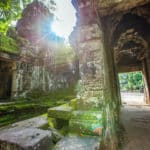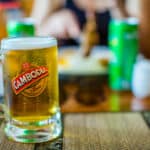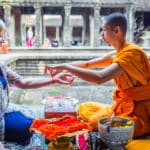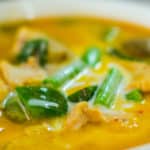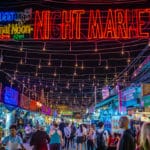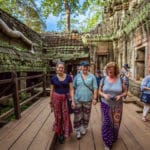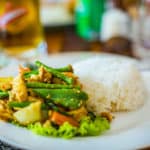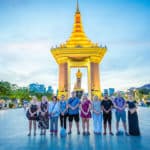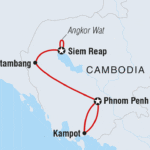Cambodia Real Food Adventure
Cambodia has a unique and ancient food culture all of its own, and unlike Thai and Vietnamese food, it's probably difficult to find a bowl of it in your local neighbourhood. Using pepper rather than chilli to add spice, Cambodian cuisine is laden with fresh herbs, spices, rice, freshwater fish and condiments. While there are influences from French and Thai styles, Cambodian food has a distinct style and flavour that's best experienced while seated at a local beer hall or family home. While travelling from Phnom Penh through to Siem Reap, discover the sights, sounds and flavours of Kampot, Battambang and Angkor Wat.
8 days, from
$1,390
per person
GROUP SIZE
ACTIVITY LEVEL
Details
Countries Visited:
Cambodia
Accommodation: Hotel (7 nights)
Transportation: Private Vehicle , Bus , Bicycle
Included Meals:
- 6 breakfasts
- 1 lunches
- 3 dinners
Group size: Minimum 1, Max 12
Minimum Age: 15
Go market to table during an immersive cooking class with a local chef in Phnom Penh
Get an insight into Cambodian cuisine with a visit to famous pepper plantations outside of Kampot, and taste the best pepper in the world
A homestay in the village of Banteay Chhmar puts you right in the heart of rural life in Cambodia
Eat for a cause with dinner at a Phnom Penh restaurant that not only serves delicious modern Cambodian cooking, but helps the local youth too
Learn about local crab and have it cooked up fresh while you look out across the Gulf of Thailand at the Kep Crab market
Itinerary
Sua s'dei! Welcome to Cambodia. The sensational Angkor ruins may be the main attraction, but Cambodia’s exquisite temples, charming villages and unique cuisine deserve attention too. Phnom Penh is set at the meeting point of the Mekong and Tonle Sap rivers, and life centres around the lively river-front area where the locals come to take in the air, snack on the street hawkers food and enjoy impromptu waterside entertainment. Your adventure begins with a welcome meeting at 6 pm. Check with hotel reception for the location of this meeting, and have your insurance details and next of kin information ready for verification. The Cambodian cooking pot combines an eclectic mix of local and international influences and has a flavour all its own. Kick off this food adventure ‘eating for a cause’ at an inspirational hospitality school that provides vocational training for former street youths in Phnom Penh. It’s a great opportunity to sample some tasty modern Cambodian cooking. After dinner will be free time to choose between having a relaxing drink at the Foreign Correspondents' Club, or stroll along the famous Sisowath Quay and enjoy a cocktail or coffee at one of the many cafes while observing the busy river traffic.
Take a morning cyclo (cycle-rickshaw) tour around Phnom Penh, discovering some of the interesting sights, sounds and smells of the capital, including the wonderful art deco-designed Psar Thmei (Central Market). Along the way, taste some of the best street food in the city, like sticky rice with beans wrapped in banana leaf and spiced fried crickets!
Back to the hotel to freshen up, and check out. Before you leave Phnom Penh, confront Cambodia's tragic past on a guided tour of the Tuol Sleng Genocide Museum, located in a former high school that served as the notorious Security Prison 21 (S-21) for the Khmer Rouge regime from 1975 to 1979.
You will also stop past the Killing Fields of Choeung Ek which represent the tragic legacy of the Khmer Rouge. Afterwards, drive south by private vehicle, towards Kampot, one of Cambodia's most attractive old towns (approximately 3 hours). Arrive in Kampot by evening.
Famous for its pepper, Kampot supplied most French restaurants for many years during colonial rule. Today, the region is also renowned for its durian, a spiky, pungent fruit that either incites adoration or sheer loathing. Try it if you dare! In some free time, you might stroll along the riverside's French colonial architecture, or enjoy a coffee on the veranda of a riverside restaurant and admire the Bokor Mountain Range.
After breakfast take a tour of the countryside, tasting locally-grown, seasonal produce. Depending on the season, you'll be treated to durian or rambutan, plus lychee, pineapples, mangos or bananas. Next, visit the Kampot Pepper Project. Grown in Cambodia for centuries, Kampot pepper is considered among the world’s finest. Today pepper is also seen as an important symbol of Cambodian regeneration – the province’s pepper was almost completely wiped out by rice production during the Khmer Rouge period. Continue on to the lively Kep Crab markets, where crabs are kept fresh in pots that float in the Gulf of Thailand's warm waters. Enjoy a lunch of fresh crab cooked to perfection, eaten on a pier overlooking the ocean. After lunch, walk along the Kep beach and explore the old oceanfront buildings. Kep was once Cambodia's most popular and prestigious beach town, but the Khmer Rouge destroyed many of Kep's mansions and villas. The ghostly remains now stand as a silent reminder. Alternatively, relax in a hammock or swim in the warm South China Sea.
Rise early to see the fishing boats arrive at the port with their daily catch. For breakfast, perhaps partake in a meal of crab, prawns or squid cooked up with Kampot green peppercorns and served with rice is. Alternatively try some of Kampot's tastiest baguettes on a visit with the owner of a small wood fired oven. This legacy of French colonization is ubiquitous – many roadside carts sell baguettes with meat, sauces and salad as a snack for workers.
After breakfast you’ll return to Phnom Penh (approximately 3.5 hours).
Meet a passionate chef for a guided tour of the markets, learning about the building blocks of Khmer cuisine. Enjoy a hands-on cooking class and master Khmer staples such as Samlor Machou Yuon (sour "Vietnamese" soup with fresh fish and tamarind) or Bok Svay (pounded green mango salad, usually served with dried fish or prawn). Feast on your creations over dinner.
Travel by private bus to Battambang (approximately 6-7 hours including several stops). Cambodia's second-largest city, Battambang (pronounced Battambong), is a pretty riverside town of French elegance, friendly Khmer people and beautifully preserved colonial architecture. The city is famous for its many statues of animals and divinities that decorate the streets and buildings. It also lacks the traffic of Phnom Penh and the visitor numbers of Siem Reap, so it’s a great place to get a real slice of Cambodia. Your leader can recommend activities for your free afternoon. Perhaps join a local Battambang foodie for a home-cooked meal, tasting local dishes such as amok, Khmer curry, and fried spicy chicken with homemade rice noodles.
Take a bicycle ride into the countryside. The ride is easy and takes in mostly shady roads through local villages. Along the way, stop and experience rice paper-making, fruit drying and preparation, production of the famous prahok (fish paste) and rice wine-making. Finish up at the best Kralan (sticky rice in bamboo) stall in the district. Then travel by private bus to the temple city of Banteay Chhmar, sometimes referred to as the Citadel of the Cat (approximately 3-4 hours). Some of the road is unsealed which slows down the journey, but it is worth it to visit this remote small community. The 9th century temple here is a top candidate for World Heritage Status, with the ruins here similar to the famous Bayon with their face towers, and surrounded by an impressive 9 kilometre-long wall. Experience true Cambodian hospitality by staying with a local family in a traditional Khmer wooden-stilted house. As the day draws to a close, enjoy a memorable traditional Khmer dinner by torch-light in the grounds of the temple. If traveling during the rainy season the temple grounds may be too wet so we will instead visit a local Community Center for a traditional dinner.
Rise early for a morning temple visit. After a traditional Khmer breakfast, take a turn around the village food market with your local hosts. Select fresh vegetables, meat and herbs and help prepare a delicious lunch with your community hosts, picking up a cooking tip or two! After your lunchtime feast, depart for Siem Reap by private vehicle (approximately 4 hours). The small but expanding town of Siem Reap is the gateway to Angkor. This is the most popular destination for travellers in all of Cambodia, perhaps even in South East Asia. You'll probably notice a change of pace here, so take a short introductory walk around the centre of town and enjoy the atmosphere. With its cafes, bars, restaurants, food and drinks stands, Siem Reap caters for foodies of all persuasions. In the evening, take a motor remork around the hidden local street food treasures of Siem Reap: barbecued corn and meat on skewers; Khmer Fried Chicken; green mango served with chilli and salt; ducks eggs and more. Finish at a dessert stall where fruit shakes, fruit with sweetened condensed milk and baked puddings are the specialty.
Spend a full day temple-hopping with your local guide to make the most of your visit to the world-famous Angkor complex, built between the 9th and 13th centuries when the Khmer empire was the pre-eminent influence in Southeast Asia. The ruins are scattered over an area of some 160 square kilometres, but the main cluster of temples is close to Siem Reap so you'll have plenty of time to fully appreciate the great archaeological sites. These include Angkor Wat, Bayon and the jungle-covered Ta Prohm. The temples were believed to represent the cosmic world and were set in perfect balance, symmetry and composition. The intricately carved bas-reliefs and architectural designs are mind-blowing and there are spectacular photographic opportunities at any time of day. In the evening, enjoy a final dinner at a plant-based restaurant celebrating contemporary Khmer flavours. Using fresh produce from their own gardens, tuck into dishes like mushroom lok lak or rice noodle soup.
Your Real Food Adventure comes to an end this morning. There are no activities on your final day and you are free to leave at any time. If you are keen to continue your exploration of the Angkor complex, please speak with your leader about extending the length of your access pass.

